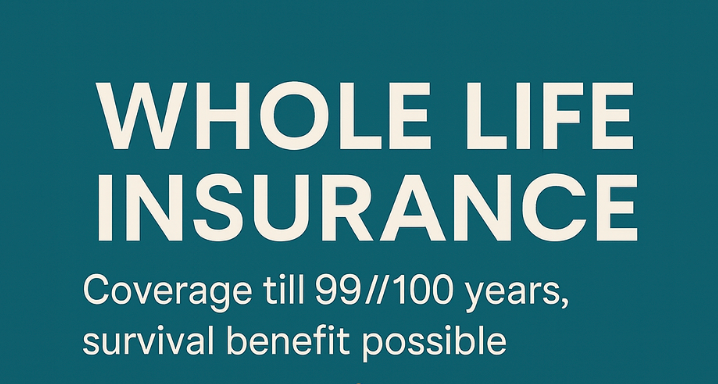Whole Life Insurance

Lifetime Coverage with Survival Benefits
Introduction: Why Whole Life Insurance Stands Out
While term life insurance focuses on pure protection for a fixed period, whole life insurance takes a different route. It offers coverage for your entire lifetime - usually up to 99 or 100 years—and often provides survival or maturity benefits if you live till the end of the policy term.
It’s not just insurance; it’s a blend of protection and savings, making it one of the most popular long-term financial planning tools for families who want both security and legacy.
What is Whole Life Insurance?
Whole life insurance is a permanent life insurance plan that continues for the insured’s entire lifetime (till 99/100 years of age). Unlike term insurance, which expires after a set period, whole life plans ensure:
- Lifetime coverage: Peace of mind for you and your loved ones.
- Guaranteed payout: Death benefit or survival benefit (depending on policy type).
- Savings component: Some plans accumulate a cash value or offer bonuses.
In simple words, it’s like planting a financial tree that grows throughout your life—providing shade when you need it and fruits for your family when you’re gone.
Key Features of Whole Life Insurance
1. Lifetime Coverage
Protection continues until age 99/100, ensuring your family is always financially secured.
2. Survival Benefit
If you outlive the policy term, you may receive a lump sum maturity benefit or accumulated bonus, depending on the plan.
3. Fixed Premiums
Premiums usually remain the same throughout the policy term, making it easier to plan long-term.
4. Cash Value Accumulation
Some whole life policies accumulate savings, which can be borrowed against in emergencies.
5. Guaranteed Death Benefit
On the policyholder’s demise, beneficiaries receive a lump sum payout, ensuring financial stability.
Benefits of Whole Life Insurance
- Family’s Financial Security: Assured payout for dependents.
- Wealth Creation + Insurance: Dual benefit of protection and savings.
- Loan Protection: Outstanding debts won’t burden your family.
- Tax Savings: Premiums eligible for deductions under Section 80C, and maturity/death benefits are tax-free under Section 10(10D).
- Legacy Planning: A great way to leave behind a financial cushion for your children or grandchildren.
Whole Life Insurance vs Term Life Insurance
Example: How Whole Life Insurance Works
Imagine Ravi, a 35-year-old father, buys a whole life plan with ₹50 lakh coverage.
- If Ravi passes away at age 60, his family gets ₹50 lakh.
- If Ravi lives till 99/100, he may receive survival benefits (like lump sum payout + bonuses).
Either way, the policy ensures value across a lifetime.
Common Myths About Whole Life Insurance
- Myth: “It’s too expensive.” Truth: Premiums are higher than term plans, but the added survival benefits and savings make it worthwhile for long-term financial planning.
- Myth: “I don’t need it if I already have investments.” Truth: Whole life insurance combines protection + disciplined savings—something markets alone can’t guarantee.
- Myth: “Coverage stops after retirement.” Truth: Whole life insurance lasts until 99/100 years, unlike term insurance.
How to Choose the Right Whole Life Policy
- Assess your goals – Do you want just protection, or protection + savings?
- Check survival benefits – Understand maturity payout rules.
- Compare insurers – Look for high claim settlement ratios.
- Decide premium payment term – Limited pay or regular pay.
- Add riders if needed – Critical illness or accidental coverage.
Conclusion: A Policy for Lifetime Security
Whole life insurance is more than just insurance—it’s a financial legacy. It ensures your family is protected no matter when life ends, and in some cases, rewards you for long life with survival benefits.
For those seeking peace of mind, long-term wealth creation, and guaranteed protection, whole life insurance is a wise choice.
Frequently Asked Questions (FAQs)
Q1: How long does whole life insurance last? It usually provides coverage up to age 99 or 100, ensuring lifelong protection.
Q2: What happens if I survive the policy term? Some plans offer a survival benefit or maturity payout, depending on the insurer’s terms.
Q3: Is whole life insurance expensive? Yes, premiums are higher compared to term insurance, but it includes lifelong coverage and possible maturity benefits.
Q4: Can I take a loan against my policy? Yes, certain whole life plans build a cash value you can borrow against in emergencies.
Q5: Is the payout taxable? No, both death benefits and survival payouts are generally tax-free under Section 10(10D).
